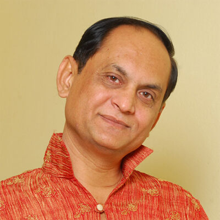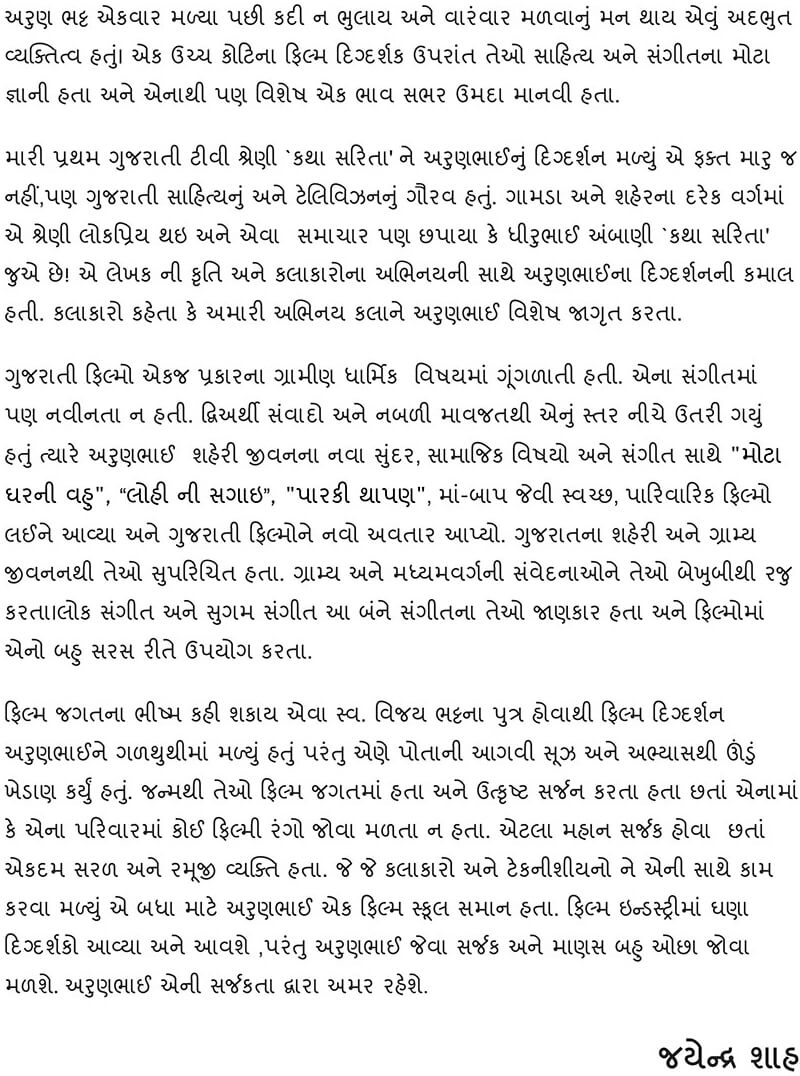Jayendra Shah

Producer of Gujarati Tele-serial "Katha Sarita"

Arun Bhatt was a phenomenal person. He was someone you’d find hard to forget after meeting once, and someone you’d want to meet over and over again. Apart from being an accomplished director, he was also a very cultured and knowledgeable person, who was well versed in history and music. But above all, he was an emotional man with an innate goodness of character.
The fact that he directed my first Gujarati serial, ‘Katha Sarita’, was a source of pride, not just for me, but for Gujarati literature and television as well. The serial was well received by rural and urban audiences. In fact, a newspaper reported that even Dhirubhai Ambani was watching the serial! The serial’s success can be attributed to the amazing work done by the writers, actors and Arunbhai’s fabulous direction. Actors would tell me that they enjoyed working with him because he tapped into their talent and inspired them to give their best performance.
At a time when Gujrati film industry was struggling with the same kind of folk and religious stories, routine soundtracks and double meaning dialogues, Arunbhai’s socials came as a breath of fresh air.
Films like Mota Gharni Vahu, Lohi Ni Sagaai, Paarki Thaapan and Maa Baap were clean, wholesome family entertainers that gave a new lease of life to the Gujarati film industry. Familiar with both rural and urban milieu, his stories reflected and appealed to middle class values. He was an aficionado of both folk music and sugam sangeet, and took a keen interest in the soundtrack of all his films. Songs from his films became very popular.
As the son of Vijay Bhatt, a stalwart of the Indian film industry, direction came easily to Arunbhai and he brought to it his own style and nuance. Despite being exposed to films since childhood and making a name for himself, his family and he were humble and not ‘filmy’. He was extremely humble, affectionate, and had a great sense of humor. Every actor or technician who worked with him considered him as a school of filmmaking.
Arunbhai was a perfectionist. For a Meghani story, we wanted to shoot in a Parsi home, which we were lucky to find in Umargam. But he also wanted a railway track, which was difficult as the railways refused to give us permission to shoot. Finally, we found an under construction railway line in Panvel. When we went there, it was raining, so we had to reschedule the shoot. The budget of a Gujarati serial cannot accommodate outdoor shoots, but somehow we were able to manage. This quest for perfection showed in his work.
Once, when we were shooting in Filmistan, Mithun Chakraborty was also there for a shoot. Having worked with Arunbhai in Ghar Jamai, he came on our set to meet him, and we had tea together. While leaving he told me, ‘Never leave this man (Arunbhai).’
There have been many directors in the Gujarati film industry, but it will be hard to find a director or a man like Arun Bhatt. Arunbhai will be remembered forever for his creations.